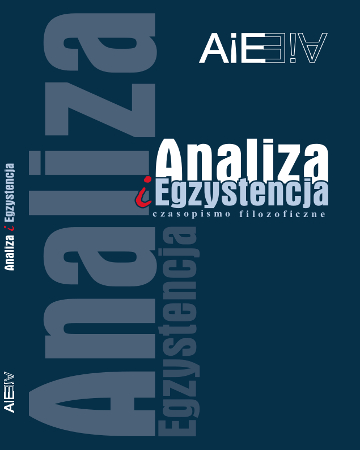
ISSN: 1734-9923
eISSN: 2300-7621
OAI
DOI: 10.18276/aie.2017.40-01





Lista wydań /
40 (2017)
Hermeneutyczna koncepcja podmiotu Martina Heideggera.
| Autorzy: |
Stanisław
Łojek
Uniwersytet Jagielloński, Wydział Stosunków Międzynarodowych i Prawnych, Instytut Europeistyki |
| Słowa kluczowe: | Heidegger hermeneutics Descartes modern subjectivity scientific picture of the world Dasein |
| Data publikacji całości: | 2017 |
| Liczba stron: | 23 (5-27) |
Abstrakt
Philosophy is hermeneutics. This statement by Martin Heidegger may be read as a call to practice philosophy in a new way and, therefore, to look critically at the whole philosophical tradition. But this new approach to philosophizing, different from the traditional one, implies different understanding of the essence of man. According to the author of Being and Time, the hermeneutical conception of humanity describes more adequately than any previous conceptions our factual experience of both ourselves and the surrounding reality. He strongly opposes it to the modern
vision of subjectivity, which he derives from Descartes. This paper is an attempt at analyzing this opposition. Much attention is devoted to the examination of the general relationship between prevailing visions of reality and dominant views on the essence of man. In particular, I’m interested in the relationship, which is very important for Heidegger, between the scientific picture of the world and the modern conception subjectivity. I consider, too, the practical consequences of the prevalence of this particular image of humanity.
Pobierz plik
Plik artykułu
Bibliografia
| 1. | Dreyfus, H. (1991). Being-in-the-World. A Commentary on Heidegger’s Being and Time. Cambridge (MA)–London: MIT Press. |
| 2. | Guignon, Ch. (2005). On Being Authentic. Taylor & Francis e-Library. |
| 3. | Heidegger, M. (1994). Bycie i czas. Tłum. B. Baran. Warszawa: Wydawnictwo Naukowe PWN. |
| 4. | Heidegger, M. (1995a). List o humanizmie. Tłum. J. Tischner. W: M. Heidegger, Znaki drogi. Warszawa: Fundacja Aletheia. |
| 5. | Heidegger, M. (1995b). O istocie racji. Tłum. J. Nowotniak. W: M. Heidegger, Heidegger, M. (2009). Podstawowe problemy fenomenologii. Tłum. B. Baran. Warszawa: Fundacja Aletheia. |
| 6. | Heidegger, M. (2001). Pytanie o rzecz. Tłum. J. Mizera. Warszawa: Wydawnictwo KR. |
| 7. | Heidegger, M. (2007). Pytanie o technikę. Tłum. J. Mizera. W: M. Heidegger, Odczyty i rozprawy (s. 7–38). Warszawa: Fundacja Aletheia. |
| 8. | Hoy, D.C. (2006). Heidegger and the Hermeneutic Turn. W: Ch. Guignon (red.), The Cambridge Companion to Heidegger (s. 177–201). New York: Cambridge University Press. |
| 9. | Lafont, C. (2007). Hermeneutics. W: H.L. Dreyfus, M.A. Wrathall (red.), A Companion to Heidegger. Blackwell Publishing. |
| 10. | Pöggeler, O. (2002). Droga myślowa Martina Heideggera. Tłum. B. Baran. Warszawa: Czytelnik. |
| 11. | Tarnas, R. (2002). Dzieje umysłowości zachodniej. Tłum. M. Filipczuk, J. Roszkowski. Poznań: Zysk i S-ka Wydawnictwo. |